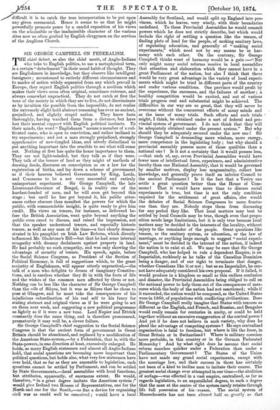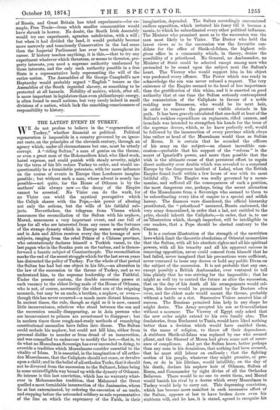SIR GEORGE CAMPRFMT, ON FEDERALISM.
TIIHE chief defect, as also the chief merit, of Anglo-Indians
who take to English politics, to use a metaphysical term, is a certain "detachment" in their usual habit of thought. They are Englishmen in knowledge, but they observe like intelligent foreigners ; accustomed to entirely different circumstances and to modes of action widely separated from any which prevail in Europe, they regard English politics through a medium which makes their views seem often original, sometimes extreme, and always somewhat impractical. They do not catch at first the tone of the society in which they are to live, do not discriminate as by intuition the possible from the impossible, do not realise the extremely slight hold abstract reasoning has over an ancient, prejudiced, and slightly stupid nation. They know facts thoroughly, having watched them from a distance, but have lost their mental rapport with English political instincts. To their minds, the word "Englishman " means a member of a cul- tivated caste, who is open to conviction, and rather inclined to try experiments ; and not a man strongly prejudiced, strongly apprehensive of new-fangled ideas, and utterly disinclined to put anything important into the crucible to see what will come out. Nothing at first has quite the home importance to them. They are not light-minded, but they talk as if they were. They talk of the tenure of land as they might of methods of iirawing deeds, discourse on conscription as on a law for the registration of births, and lay down a scheme of government as if their hearers believed Government by King, Lords, and Commons to be a not very successful and entirely -unimportant experiment. Sir George Campbell, the late Lieutenant-Governor of Bengal, is in reality one of the hardest-headed •of men, and he will soon get beyond this stage; but until he has got beyond it, his public utter- ances rather obscure than manifest the powers for which the public, with commendable insight, is quite ready to give him credit. His views on tenure, for instance, as delivered be- fore the British Association, went quite beyond anything the public even cared to discuss and raised the impression, not that the speaker understood tenure, and especially historic tenure, as well as any man of his time—a fact clearly demon- strated in his pamphlet on Irish Law Reform, which directly influenced Mr. Gladstone's Bill—but that he had some internal sympathy with dreamy declaimers against property in land. He had probably no such sympathy, and was only showing the advantage of security of tenure. His speech, again, before the Social Science Congress, as President of the Section of Political Economy, is full of suggestions which, to the great majority of Englishmen will appear utterly unpractical,—the talk of a man who delights to dream of imaginary Constitu- tions, and is careless whether they fit in with the facts of life and the wishes of the common men affected by them or not. Nothing can be less like the character of Sir George Campbell than the role of Sieyes, but it was as Sieyes that he chose to pose at Glasgow, and he must take the consequences of his injudicious subordination of his real self to his fancy for stating abstract and original views as if he were going to act on them next week, and suggesting a new political programme as lightly as if it were a new tune. Lord Napier and Ettrick constantly does the same thing, and is therefore pronounced, prematurely it may well be, a clever failure.
Sir George Campbell's chief suggestion to the Social Science Congress is that the ancient form of government in Great Britain should be abandoned, and replaced by a modification of the American State-system,—by a Federation, that is with the State-powers, in one direction at least, excessively enlarged. He holds, as many English statesmen and almost all Anglo-Indians hold, that social questions are becoming more important than political questions, but holds also, what very few statesmen have ever held, that so far as they are amenable to legislation, such questions cannot be settled by Parliament, and can be settled by State Governments,—local assemblies with local functions, but attributes, apparently, of enormous extent. He would, therefore, "in a great degree imitate the American system ;" would give Ireland two Houses of Representatives, one for the North and one for the Bouth,—as fine a device for organizing civil war as could well be conceived ; would have a local Assembly for Scotland, and would split up England into pro- vinces which he leaves, very wisely, with their boundaries undefined. To these Provincial Assemblies he would commit powers which he does not strictly describe, but which would include the right of settling a question like the tenure, of finding plots of land for the people, of making sanitary laws, of regulating education, and generally of "making social experiments," which need not by any means be in har- mony with each other. On the contrary, Sir George Campbell thinks want of harmony would be a gain :—" Not only might many social reforms receive in local assemblies that attention and elaboration which they cannot have in a great Parliament of the nation, but also I think that there would be very great advantage in the variety of local experi- ments which might be tried in different parts of the country and under various conditions. One province would profit by the experience, the successes, and the failures of another ; a healthy competition would be excited, and out of various trials progress real and substantial might be achieved. The difficulties in our way are so great, that they will never be overcome without the concurrent efforts of many minds and as the issue of many trials. Such efforts and such trials might, I think, be obtained under a sort of federal and pro- vincial system of government. I do not think that they will be adequately obtained under the present system." But why should they be adequately secured under the new one ? Sir George Campbell is demanding more wisdom, more energy, more competence in the legislating body ; but why should a provincial assembly possess more of those qualities than a national one ? Is it not a certainty that it would possess less, —that each of, say, seven Provincial Assemblies would have fewer men of intellectual force, experience, and administrative faculty than one National Assembly, that it would be governed by smaller motives, display less magnanimity, collect less knowledge, and generally prove itself an inferior Council to the ancient Parliament ? Is it the fact that a Vestry can settle a great question better than the House of Com- mons? That it would have more time to discuss social experiments is true, but time is not the only condition required for the settlement of great affairs, else would the debates of Social Science Congresses be more fructu- ous than they are. Nobody stops them from discussing for any period they like. That local matters may best be settled by local Councils may be true, though even that propo- sition needs large limitations, but it is only true because local matters may be decided in the interests of the locality, without injury to the remainder of the people. Great questions like tenure, or the sanitary system, or education, or the law of marriage, or anything large enough to suggest "social experi- ment," must be decided in the interest of the nation, if indeed the nation is to exist at all. We may be sure that Sir George Campbell, who has helped to rule a dependent Empire, is an Imperialist, recklessly as he talks of the Canadian Dominion being a danger, and of our right to terminate that danger, whether Canadians like it or not ; but as an Imperialist, he can- not have adequately considered his own proposal. If it failed, it would produce in a kingdom so small as this endless confusion and disaster, the Provincial Assemblies being obliged to call on the national power to help them out of the consquences of mea- sures which the body of the nation had not sanctioned; while if it succeeded, the nation would be composed, as the United States were in 1860, of populations with conflicting civilisations. Does Sir George Campbell really imagine that States with tenures as different as the English, and French, and Russian, and Bengalee would really remain for centuries in amity, or could be held together without an excessive exaggeration of the central power ? And yet if he does not believe in such variety, why does he plead the advantage of competing systems ? Be says centralised organisation is fatal to freedom, but where is life the freer, in Great Britain or in Switzerland Where is military coercion more probable in this country or in the German Federated Monarchy ? probable, by what right does he assume that social reform marches quicker under a Federation than under a Parliamentary Government? The States of the Union have not made any grand social experiments, except with the marriage law, and their success in those has cirtainly not been of a kind to incline men to imitate their course. The greatest social change ever attempted in our time—the abolition of serfage—was effected in a vast empire, centralised, as far as regards legislation, to an unparalleled degree, to such a degree that the man at the centre of the system rarely retains through life full possession of his reason. The social system of Massachusetts has not been altered half so greatly as that of Russia, and Great Britain has tried experiments—for ex- ample, Free Trade—from which smaller communities would have shrunk in horror. No doubt, the South Irish Assembly would try one experiment, agrarian subdivision, with a will ; but when it had divided the land, it would probably become more narrowly and tenaciously Conservative in the bad sense than the Imperial Parliament has ever been throughout its career. If history teaches anything, it is this,—that to try any experiment whatever which threatens, or seems to threaten, pro- perty interests, you need a supreme authority unalarmed by those interests, and the only such authority possible in a free State is a representative body representing the will of the entire nation. The Assemblies of Sir George Campbell's new Heptaxchy would probably regard " English " tenure as the Assemblies of the South regarded slavery, as something to be protected at all hazards. Nobility of motive, which, after all, is more important in legislators than even philanthropic energy, is often found in small nations, but very rarely indeed in small divisions of a nation, which lack the ennobling consciousness of responsibility to history.







































 Previous page
Previous page